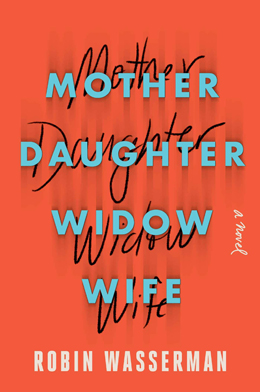When Robin Wasserman released Girls on Fire in 2016, she demonstrated how her style of writing provocative and powerful fiction for younger readers could successfully transition to thought-provoking and complex adult novels. Now with Mother Daughter Widow Wife she also proves that her hallmark of blending multiple genres to create a wholly-original approach might even resonate more when the target audience has an extensive history with the universal body of literature.
Mother Daughter Widow Wife is a complex novel in terms of structure, theme, motive, and outcome. It is the type of novel that no two readers will experience the same. Similarly to how we saw Ivy Pochoda approach the theme earlier this year in These Women, here Robin Wasserman is using the specific journeys of a collection of women to pave the path to a more serious examination of universal womanhood. A quote from early in the novel sums this up nicely for readers: “all women were in some sense the same woman…”
At its core, Mother Daughter Widow Wife is a quest novel: Alice is looking to find her mother who has gone missing. Because of her mother’s troubling history, most assume that she is dead, however Alice is not willing to let go until she has more answers. This brings her to the doorstep of Elizabeth, a woman who was once a protegee of the legendary neuroscientist, Benjamin Strauss. It turns out that twenty years earlier Lizzie – as she was known back then – participated in a study on the mind (specifically the existence of fugue states) in which Alice’s mother was the principle subject of analysis. Knowing that her mother has suffered from amnesia and has disappeared on more than one occasion gives Alice hope that she can once again locate her. The experiences of these woman in various timelines merge to paint a stunning portrait of womanhood.

Mother Daughter Widow Wife requires the active participation of the reader. This is not the type of book you pick up to read as you drift off to sleep each night. Wasserman’s intricate style means that readers are often left wondering how different elements connect together – answers that are often provided, but which sometimes necessitate that the reader draw their own conclusions as well. This lack of the definitive may flummox some readers, but those that are willing and able to join Wasserman and her characters on this excursion – this expedition – as equal partners will be rewarded with new insights at the conclusion.
Themes examining how women are often treated as invisible, how a woman’s body is rarely viewed as belonging to her, and other challenges of being a woman in a male-dominated society are not new to the fiction realm. And in many ways, what Robin Wasserman is conveying here is nothing ground-breaking, but it is the way that she brings the stories of these women together that creates the magic in this particular case. While this is technically a thriller, it is a slow burn, one in which the investment of time is necessary, but also one that is not easily forgotten once experienced. Expect Robin Wasserman’s Mother Daughter Widow Wife to be a fixture of Best Of lists this Fall.
BUY LINKS: Mother Daughter Widow Wife by Robin Wasserman
Disclaimer: A print galley of this title was provided to BOLO Books by the publisher. No review was promised and the above is an unbiased review of the novel.
